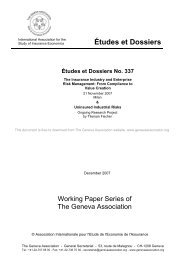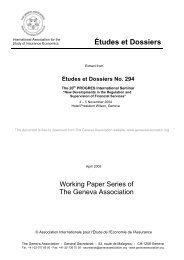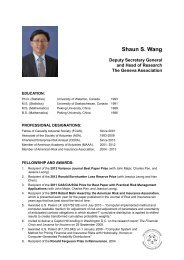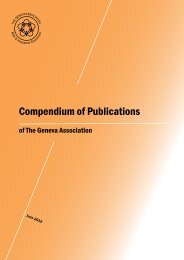Addressing the Challenge of Global Ageing?Funding Issues and
Addressing the Challenge of Global Ageing?Funding Issues and
Addressing the Challenge of Global Ageing?Funding Issues and
You also want an ePaper? Increase the reach of your titles
YUMPU automatically turns print PDFs into web optimized ePapers that Google loves.
10<br />
<strong>Addressing</strong> <strong>the</strong> <strong>Challenge</strong> <strong>of</strong> <strong>Global</strong> <strong>Ageing</strong>—<strong>Funding</strong> <strong>Issues</strong> <strong>and</strong> Insurance Solutions<br />
underst<strong>and</strong>ing <strong>the</strong> need to pursue a multi-pillar approach, save more (Pillar III) <strong>and</strong><br />
mitigate <strong>the</strong> risk <strong>of</strong> outliving savings through <strong>the</strong> purchase <strong>of</strong> annuities.<br />
Gordon Stewart, Liaison Officer North America, The Geneva Association, complements<br />
<strong>the</strong> global stakeholder view with a specific perspective on retirement security in <strong>the</strong><br />
United States as a major national challenge. The author focuses on <strong>the</strong> consequences<br />
<strong>of</strong> an erosion <strong>of</strong> <strong>the</strong> old-age security system in <strong>the</strong> U.S. when a central pillar <strong>of</strong> a noncomprehensive<br />
national retirement system falls. Stewart argues that <strong>the</strong> most serious<br />
threat to <strong>the</strong> stability <strong>of</strong> <strong>the</strong> four pillars in <strong>the</strong> U.S. results from <strong>the</strong> virtual demise <strong>of</strong><br />
<strong>the</strong> second pillar <strong>of</strong> employer-sponsored DB plans <strong>and</strong> <strong>the</strong> inability <strong>of</strong> <strong>the</strong> third pillar<br />
<strong>of</strong> individual defined contribution (DC) plans as presently structured to fully carry its<br />
own weight, especially in <strong>the</strong> current environment <strong>of</strong> record-low investment yields.<br />
He diagnoses a “retirement crisis in slow motion, one which can be met, but only if its<br />
government, business community, <strong>and</strong> individual stakeholders find <strong>the</strong> will <strong>and</strong> <strong>the</strong> ways<br />
to overcome <strong>the</strong>ir increasingly bitter divisiveness <strong>and</strong> recover <strong>the</strong>ir historic ability to<br />
transcend political differences when <strong>the</strong> future <strong>of</strong> <strong>the</strong> nation itself is threatened.”<br />
Against this backdrop, <strong>the</strong> author addresses <strong>the</strong> key question <strong>of</strong> how <strong>the</strong> deteriorating<br />
outlook for retirement security can be halted <strong>and</strong> altered. In Stewart’s view, individual<br />
stakeholders cannot do so—whatever <strong>the</strong>ir size, importance, <strong>and</strong> intentions. He argues<br />
that insurers are near <strong>the</strong> top <strong>of</strong> <strong>the</strong> list <strong>of</strong> concerned stakeholders, given that pensions,<br />
annuities <strong>and</strong> tax-advantaged asset growth are among <strong>the</strong>ir core competencies <strong>and</strong> reasons<br />
for being. Stewart stresses that insurance concepts <strong>and</strong> mechanisms will be indispensable<br />
to any comprehensive national solution. “And it should not be beyond <strong>the</strong> financial<br />
capability <strong>of</strong> insurers <strong>and</strong> <strong>the</strong> political competence <strong>of</strong> government to develop or revise<br />
public policies that will enable insurance concepts <strong>and</strong> mechanisms to greatly streng<strong>the</strong>n<br />
Pillar III private savings as a foundation <strong>of</strong> <strong>the</strong> retirement security <strong>of</strong> those workers who<br />
have access to <strong>the</strong>m <strong>and</strong> sufficient income to accumulate significant savings,” Stewart<br />
concludes.<br />
The International Monetary Fund (IMF) analyses <strong>the</strong> implications <strong>of</strong> global ageing<br />
<strong>and</strong> increasing longevity from a public finance <strong>and</strong> fiscal policy perspective, focusing<br />
on advanced economies. The authors argue that public pension reform <strong>and</strong> a major<br />
rationalisation <strong>of</strong> public spending will be a key policy challenge in advanced economies<br />
over coming decades, not least as many countries will need to achieve meaningful<br />
fiscal consolidation over that period. The economic <strong>and</strong> financial crisis has significantly<br />
exacerbated <strong>the</strong> fiscal challenges ahead. At <strong>the</strong> same time, “it is important that pension<br />
reforms do not undermine <strong>the</strong> ability <strong>of</strong> public pension systems to alleviate poverty among<br />
<strong>the</strong> elderly,” <strong>the</strong> authors emphasise.<br />
According to <strong>the</strong> IMF, in advanced economies, public pension spending increased from<br />
5 per cent <strong>of</strong> GDP in 1970 to 8.5 per cent in 2010. The four drivers behind <strong>the</strong> change<br />
in public pension spending as a share <strong>of</strong> GDP are ageing, eligibility rates (<strong>the</strong> number <strong>of</strong><br />
pensioners as a proportion <strong>of</strong> <strong>the</strong> population 65 <strong>and</strong> older), replacement rates (<strong>the</strong> ratio <strong>of</strong><br />
average pension to average wages) <strong>and</strong> labour force participation rates.<br />
The authors share <strong>the</strong>ir outlook for public pension spending <strong>and</strong> expect it to increase by<br />
about 1 percentage point <strong>of</strong> GDP over <strong>the</strong> next two decades. In addition to <strong>the</strong>se projected<br />
increases in public pension spending, governments face o<strong>the</strong>r fiscal challenges, most<br />
notably from <strong>the</strong>ir healthcare systems. In advanced economies, public health spending<br />
is projected to rise in <strong>the</strong>se countries on average by 3 percentage points <strong>of</strong> GDP over <strong>the</strong>








